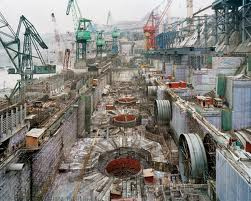When we look back over the course of the past hundred years it becomes clear that the period 1948-1973 was a golden one for the “developed” countries. Seventy-five per cent of world economic production came from them and 80 per cent of manufactures were exported by them. This was the era of the greatest economic expansion of the century not only in terms of growth but also in terms of the decrease in unemployment: in the United States at its most impressive unemployment was at 2.93 per cent in 1953, in Western Europe the unemployment rate in the 1960s was 1.5 per cent and in Japan it was 1.3 per cent. Technological innovation was central to the advances brought about during this economic golden age.
Technical advance — according to Eric Hobsbawm’s The Age of Extremes — had three significant impacts. First, it transformed everyday life in the affluent world: before 1945 most families in the “developed world” would not have had a refrigerator, a television, vinyl records, tape cassettes, transistor radios, digital watches, pocket calculators, video equipment or general access to the birth control pill. Second, disproportionately more money was now spent on research and development (R&D) than ever before, thus bolstering the dominance of the wealthy regions of the world over the poor. By the 1970s the affluent countries had over 1000 scientists and engineers for every million people in population while Pakistan averaged around 60 and Kenya around 30. Third, and most importantly for the period after the 1970s, the new technologies were capital-intensive and eventually labour-replacing: machines would build automobiles, computers would manage trains, and money would be deposited, invested and withdrawn without the intervention of tellers. The significance of technological progress was that employees in the rich countries — other than scientists and engineers — would eventually become more crucial to the success of the economy as consumers rather than as producers.
Technology’s great leap forward — and our deification of it — continues unabated: it is now enabling some corporations to “in-source” production. Historically, technology facilitated companies’ abilities, especially those from the United States, to “out-source” production, though not necessarily co-ordination, to other parts of the world thus substantially reducing the costs of labour. Today, because of computerization and other factors, some companies are choosing to return some of their manufacturing processes back to the United States. Tyler Cowen notes in the May/June 2012 issue of The American Interest that “in a manufacturing survey from November 2011, almost one-fifth of North American manufacturers claimed to have brought production back from a ‘low-cost’ country to North America.” While it would be understandable for workers to stand up and cheer at the thought of companies returning to their country, their elation would be short-lived. Artificial intelligence and computing power are taking over manufacturing, thus transforming factories into quiet, empty spaces whose only sound is the hum of a machine.
The contemporary factory no longer needs many workers: labour costs, in manufacturing, have become much less significant than they once were because technical advance has made labourers much less significant. Companies are starting to return more of their production operations back to the United States and this will enable the country to recapture its standing as the world’s most powerful economy. The increase in American productivity, exports and status will be wonderful news for investors, high-end workers and flag-manufacturers but it will mean little for today’s unemployed or precariously employed human beings.
Thomas Ponniah was a Lecturer on Social Studies and Assistant Director of Studies at Harvard University from 2003-2011. He remains an affiliate of Harvard’s David Rockefeller Center for Latin American Studies and an Associate of the Department of African and African-American Studies.
Photo: Ed Burtynsky/TED Conference/Flickr



